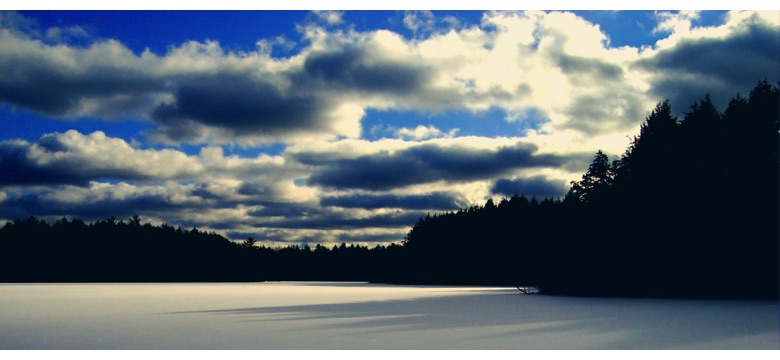Scaling lake biogeochemistry (NSF DEB-1547866)
Because lakes integrate matter and energy from their watersheds, they are often considered biogeochemical hot spots in the landscape. As a result, lakes can have a disproportionate effect on regional elemental cycles, relative to their cumulative area. Despite demonstrable contributions to regional and global greenhouse gas cycles, lakes are usually ignored in global climate models. Recent efforts to include lakes in the global climate conversation have been hampered by difficulties in scaling site-based measures to regional or global budgets. We are using regional hydrologic models and biogeochemical reactor models to quantify lake contributions to regional greenhouse gas dynamics and long-term carbon burial.
Social-ecological dynamics of recreational fishery landscapes (NSF DEB-1716066)
Recreational fishery landscapes occur across the United States and the world and have tremendous cultural and economic value, yet they are vulnerable to degradation and in many regions are suffering collapses parallel to, though less heralded than, the collapses that have plagued many marine fisheries. Theory suggests that involvement of local organizations in governance may improve outcomes in common-pool resource systems, but it is not yet clear whether this arrangement can be effective. This project focuses on identifying pathways and obstacles for effective governance of recreational fishery landscapes, and on using these systems to test and extend social, ecological, and social-ecological theory. We are using snorkel surveys and large-scale experiments to ask how habitat complexity influences juvenile fish mortality and the relationship between fish abundance and angler catch. With collaborators we are also interviewing anglers and building economic models to understand how angler preferences and information sources determine the allocation of fishing effort across the landscape, and conducting interviews with local organizations and cataloging their institutional arrangements in order to understand how they make decisions about investments in fishery quality and to analyze the organizational characteristics that lead to successful collective action. Finally, we are linking stage-structured fisheries models with agent-based social models to synthesize our results and explore pathways and obstacles to effective governance of recreational fishery landscapes.
Implications of terrestrial carbon for aquatic ecosystems (NSF DEB-1754561)
The influence of resource subsides on food webs and ecosystems have been recognized for at least half a century. Current ecologists recognize and embrace the concept that the boundaries of ecosystems are open for the transfer of matter, energy, and individuals. One classic example of cross-ecosystem transport of matter is the flow of terrestrial-derived carbon to aquatic ecosystems. The observation that terrestrial carbon supply to the majority of aquatic ecosystems around the globe has increased over the past two decades reaffirms the importance of this flow. Much of the research quantifing the contribution of terrestrial carbon to aquatic consumers has been conducted at the University of Notre Dame Environmental Research Center (UNDERC). Our lab is continuing this tradition by exploring the implciations of terrestrial-derived carbon for the stability and productivity of aquatic ecosystems. The dual role of terrestrial-derived carbon as a resource and physiochemical regulator means that it can have diverse, complex impacts on recipient lakes. Using mathematical models, comparative studies, and whole-ecosystem experiments, we have demonstrated far-reaching impacts on lake food web productivity, atmospheric exchange of carbon dioxide, and ecosystem stability.
Microbial traits and their implications for community assembly and ecosystem function (NSF DEB-1442230)
Microorganisms are the most abundant and diverse biota on Earth. They regulate global biogeochemical cycles, influence human health, and are responsible for the fate of contaminants in the environment. Despite their importance, we do not understand what maintains microbial diversity, how microbial communities are assembled, or the degree to which microbes will adapt to global change. Recent developments in trait-based ecology and molecular biology provide a unique opportunity to link the genetic, taxonomic, and functional aspects of microbial diversity to their effects on ecosystem functions. We are using lab-based measurement of ecophysiological traits and comparative genomics to identify ecological tradeoffs likely to be maintaining microbial diversity, structuring microbial communities, and regulating microbial contributions to ecosystem function.
Watershed and food web influences on methane in lakes
Although carbon dioxide is most often discussed in the global warming conversation, methane is a less abundant but more potent greenhouse gas. Lakes represent a key component of the global carbon cycle, including methane. The flux of methane from or to lakes is regulated by two major microbial groups. Methanogenic Archaea, present in the sediments of lakes, are responsible for the production of methane. Methane oxidizing bacteria or methanotrophs are responsible for the consumption of methane in lakes and other ecosystems.The activity of these microbes are regualted by ecological interactions with their environment and other lake inhabitants. Global-scale change in climate as well as land use by humans is forcing changes in the aquatic environment. The amount and chemical characteristics of material flowing from the land to aquatic ecosystems is changing rapidly. In addition, the ever increasing human population is strongly influencing animal populations both directly by harvest and indirectly, often through habitat change. These anthropogenic pressures have dramatic impacts on the configuration of aquatic food webs. Our lab is using geographically broad lake surveys, mathematical models, and experimentation at the lab and ecosystem scale to develop predictions for the role of lakes in the global methane cycle under these changing conditions.
